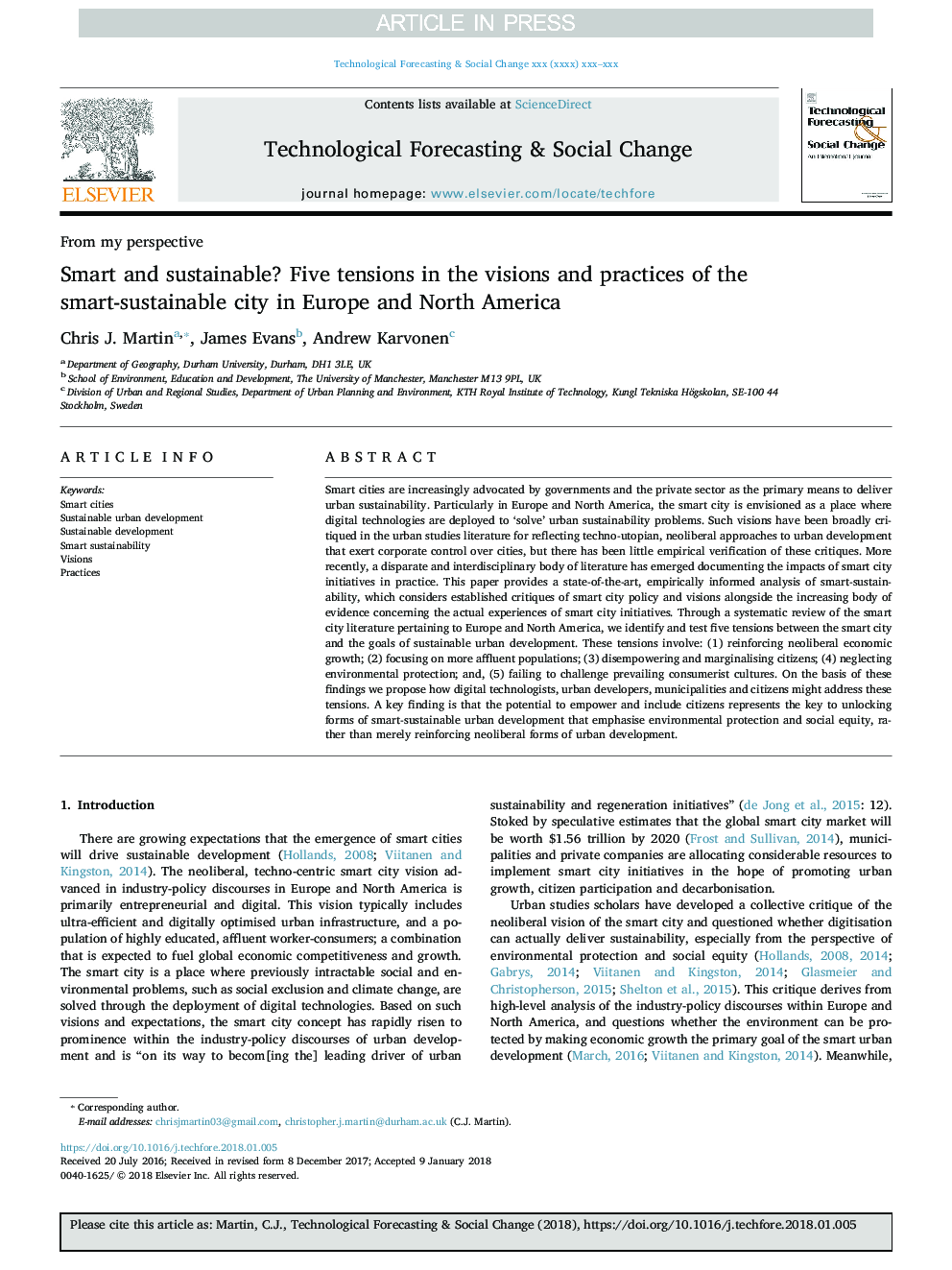| کد مقاله | کد نشریه | سال انتشار | مقاله انگلیسی | نسخه تمام متن |
|---|---|---|---|---|
| 7255240 | 1472368 | 2018 | 10 صفحه PDF | دانلود رایگان |
عنوان انگلیسی مقاله ISI
Smart and sustainable? Five tensions in the visions and practices of the smart-sustainable city in Europe and North America
ترجمه فارسی عنوان
هوشمند و پایدار؟ پنج تنش در دیدگاه ها و شیوه های شهر هوشمند پایدار در اروپا و آمریکای شمالی
دانلود مقاله + سفارش ترجمه
دانلود مقاله ISI انگلیسی
رایگان برای ایرانیان
کلمات کلیدی
شهرهای هوشمند، توسعه شهری پایدار، توسعه پایدار، پایداری هوشمند، چشم اندازها، تمرینات
ترجمه چکیده
شهرهای هوشمند به طور فزاینده ای از سوی دولت ها و بخش خصوصی به عنوان ابزار اصلی برای تحقق پایدار شهری حمایت می شوند. به ویژه در اروپا و آمریکای شمالی، شهر هوشمند به عنوان مکانی که در آن فن آوری های دیجیتال برای حل مسائل پایدار شهری به کار گرفته شده است، پیش بینی شده است. چنین تصورات در ادبیات مطالعات شهری به طور گسترده ای مورد انتقاد قرار گرفته است تا منعکس کننده روش های تکنولوژیکی و نئولیبرالی برای توسعه شهری باشد که کنترل شرکت ها بر شهرها را تأمین می کند، اما تجربیات کمی از این انتقادات وجود دارد. اخیرا، مجموعه ای از متون متضاد و بین رشته ای از ادبیات به اثبات برساختن تاثیرات ابتکارات شهری شهری در عمل پرداخته است. این مقاله، تحلیلی تجربی آگاهانه از پایداری هوشمند را ارائه می دهد که نقاط ضعف سیاست و دیدگاه های شهر هوشمند را در کنار افزایش شواهدی از تجربیات واقعی از ابتکارات شهر هوشمند بررسی می کند. با بررسی منظم ادبیات شهر هوشمند مربوط به اروپا و آمریکای شمالی، پنج تنش بین شهر هوشمند و اهداف توسعه پایدار شهری را شناسایی و آزمون می کنیم. این تنش ها عبارتند از: (1) تقویت رشد اقتصادی نئولیبرالی؛ (2) تمرکز بر جمعیت با ثروتمندتر؛ (3) شهروندان محروم و حاشیه نشین؛ (4) نادیده گرفتن حفاظت از محیط زیست؛ و (5) ناکامی در مبارزه با فرهنگ مصرف کننده غالب. بر اساس این یافته ها ما پیشنهاد می کنیم که چگونه تکنسین های دیجیتال، توسعه دهندگان شهری، شهرداری ها و شهروندان می توانند این تنش ها را حل کنند. یافته های کلیدی این است که پتانسیل توانمند سازی و شامل شهروندان، کلید باز کردن اشکال توسعه شهری پایدار و هوشمند است که بر حفاظت از محیط زیست و حقوق اجتماعی تأکید دارند، نه فقط تقویت اشکال نئولیبرالی توسعه شهری.
موضوعات مرتبط
علوم انسانی و اجتماعی
مدیریت، کسب و کار و حسابداری
کسب و کار و مدیریت بین المللی
چکیده انگلیسی
Smart cities are increasingly advocated by governments and the private sector as the primary means to deliver urban sustainability. Particularly in Europe and North America, the smart city is envisioned as a place where digital technologies are deployed to 'solve' urban sustainability problems. Such visions have been broadly critiqued in the urban studies literature for reflecting techno-utopian, neoliberal approaches to urban development that exert corporate control over cities, but there has been little empirical verification of these critiques. More recently, a disparate and interdisciplinary body of literature has emerged documenting the impacts of smart city initiatives in practice. This paper provides a state-of-the-art, empirically informed analysis of smart-sustainability, which considers established critiques of smart city policy and visions alongside the increasing body of evidence concerning the actual experiences of smart city initiatives. Through a systematic review of the smart city literature pertaining to Europe and North America, we identify and test five tensions between the smart city and the goals of sustainable urban development. These tensions involve: (1) reinforcing neoliberal economic growth; (2) focusing on more affluent populations; (3) disempowering and marginalising citizens; (4) neglecting environmental protection; and, (5) failing to challenge prevailing consumerist cultures. On the basis of these findings we propose how digital technologists, urban developers, municipalities and citizens might address these tensions. A key finding is that the potential to empower and include citizens represents the key to unlocking forms of smart-sustainable urban development that emphasise environmental protection and social equity, rather than merely reinforcing neoliberal forms of urban development.
ناشر
Database: Elsevier - ScienceDirect (ساینس دایرکت)
Journal: Technological Forecasting and Social Change - Volume 133, August 2018, Pages 269-278
Journal: Technological Forecasting and Social Change - Volume 133, August 2018, Pages 269-278
نویسندگان
Chris J. Martin, James Evans, Andrew Karvonen,
